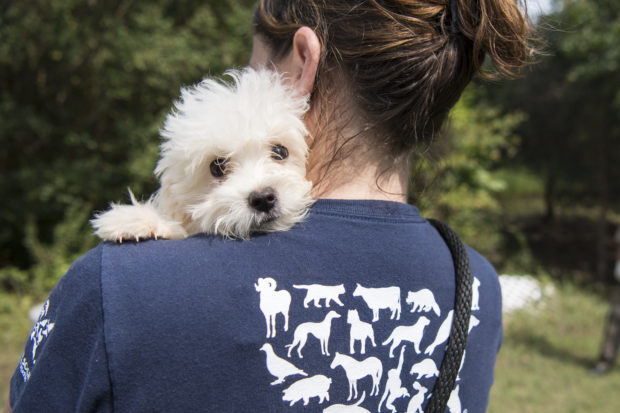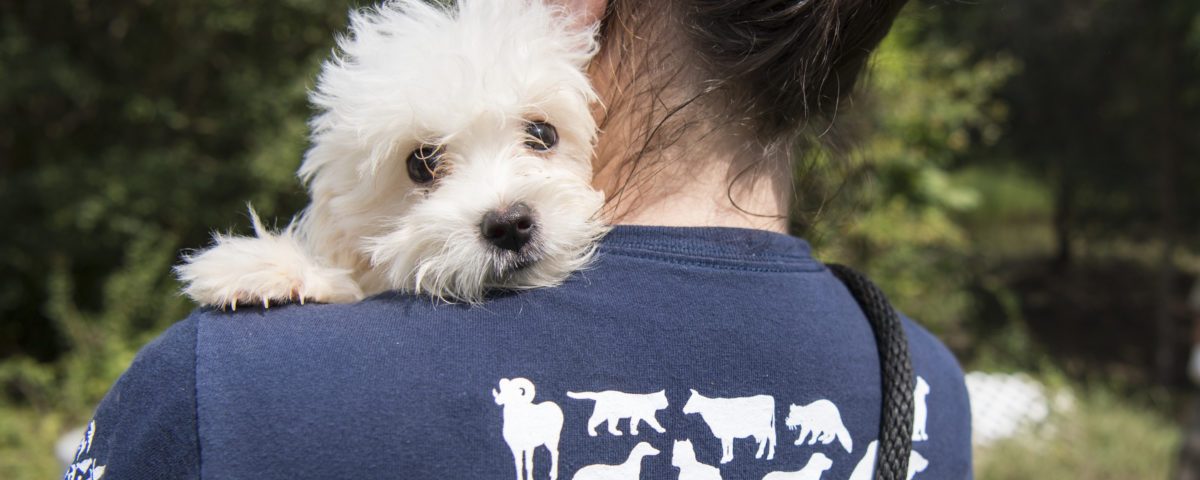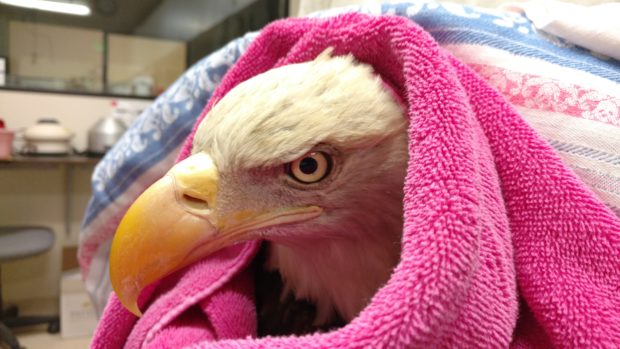At The Fund for Animals Wildlife Center in San Diego County, the staff treats a wide range of native animals who are in some kind of trouble. But when a call came in from a hiker who claimed to have found a sick bald eagle in the woods, their bat ears and their skepticism went up. “We get a lot of calls about eagles—and it’s never an eagle,” says center director Ali Crumpacker.

The HSUS, with our affiliates, is the number one animal care provider in the nation, and perhaps in the world, among non-profit organizations. Photo by Meredith Lee/The HSUS
But they now know never to say never. A preliminary exam showed the eagle, while lethargic, had no obvious injuries, so our staff transported him to the Pet Emergency and Specialty Center in La Mesa, California. There, he was diagnosed as suffering from the mosquito-borne West Nile virus. Days of intensive, hands-on care followed, with FFAWC staff working with the raptor closely to help him gain strength, flying endurance, and – most important – his wild bird attitude. Our state-of-the art aviary made it possible, and only three weeks later, after a final veterinary exam and with the hiker who rescued him present, the eagle caught the currents high in the air and regained his freedom.
The HSUS and its affiliates work for animals through so many channels – driving lawmaking to protect animals, ensuring that these laws are enforced, negotiating agreements with the biggest companies, calling out cruelty wherever we see it, shaping public attitudes, and elevating the status of animals in society. But we also are, with our affiliates, the number one animal care provider in the nation, and perhaps in the world, among non-profit organizations.
With the new year in sight, The HSUS, Humane Society International, The Fund for Animals, the Humane Society Veterinary Medical Association, and South Florida Wildlife Center are closing in on providing direct care and services to 300,000 animals in 2016—far surpassing our numbers in previous years. We help wild animals at risk through our wildlife rehabilitation centers, prairie dog and gopher tortoise relocations, and our wildlife response unit. We help extraordinary numbers of free-roaming dogs through our Street Dog Defender programs globally – from India to the Philippines to Bhutan. We come to the aid of animals in crisis when natural disasters strike or when we sniff out animal fighting operations, cruelty and hoarding cases, or delinquent puppy mills. We help companion animals and their families by bringing pet care services to underserved high-poverty areas through our Pets for Life program in 34 cities and through our Rural Area Veterinary Services programs that visit remote Native American reservations.
This bald eagle diagnosed with West Nile virus received three weeks of intensive, hands-on care at our Fund for Animals Wildlife Center in San Diego County before he was released back into the wild. Photo by Christine Barton/The HSUS
Our Fund for Animals Wildlife Center treats injured and sick wildlife and releases them into the wild, but it also cares around the year for 30 full-time residents saved from the exotic pet trade and other acts of cruelty. Our South Florida Wildlife Center in Fort Lauderdale rescues and rehabilitates more than 12,000 animals each year. Our Cleveland Amory Black Beauty Ranch in Texas is home to hundreds of animals rescued from research laboratories, circuses, roadside menageries, captive hunting ranches, factory farming, and other situations where they were at risk or in grave danger. Our Duchess Sanctuary in Oregon is a 1,120-acre oasis for about 200 formerly abused, abandoned, neglected, and homeless horses. Our Doris Day Equine Center works with equine rescues around the country to help them better rehabilitate and rehome difficult horses.
Our Pets for Life program is now in its sixth year, and has served more than 120,000 pets in 34 cities across the country. This year alone, in our four direct care cities, our teams helped 14,000 animals, offering veterinary and wellness care to people and pets who live in underserved areas. These include pets like PeeWee, a cat who hurt his front paw earlier this year. PeeWee’s mom, Patricia, could not afford his treatment, so Pets for Life jumped in to help with a veterinary appointment to assess and treat the injury. PeeWee received a course of antibiotics to prevent an infection, and was also neutered and received his vaccinations, all free of cost to Patricia. Since Patricia does not have transportation and could not make frequent trips to the vet, our PFL staff worked with her to clean his paw and change PeeWee’s bandage twice a week for two months.
On this blog, I’ve shared with you a few of the many remarkable rescues that our Animal Rescue Team conducts throughout the year, saving horses, dogs, cats, and other animals from hurricanes or floods or responding to puppy mills that bring animals to the brink of death. Recently, I wrote about the work we’re doing to help gopher tortoises and prairie dogs threatened by development, by rescuing and relocating them. A Humane Society International team deployed to Haiti to help animals affected by the hurricane. HSI also helped conduct hundreds of spay and neuter and vaccination clinics in countries around the world, and rescued hundreds of dogs from being butchered for meat in China and South Korea.
The advocacy work of The HSUS and its affiliates improves the fortunes of millions of animals each year. But our hands-on care work is some of the most rewarding because it puts us directly in touch with animals who have no one else to comfort them, and it feels good to be able to do so. It also helps us, as we document abuses and show them to the world, to make the case for reform, so that animals don’t get put into situations of distress in the first place. I am proud to celebrate this milestone for the nearly 300,000 animals who are leading better lives, thanks to your support and the hard work of our staff and volunteers in 2016.
The post The HSUS and affiliates provided hands-on care to nearly 300,000 animals in 2016 appeared first on A Humane Nation.
Enviroshop is maintained by dedicated NetSys Interactive Inc. owners & employees who generously contribute their time to maintenance & editing, web design, custom programming, & website hosting for Enviroshop.

